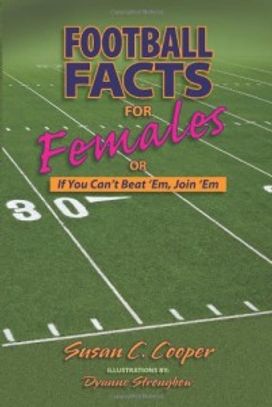Books By Susan C Cooper
Writing Roots: How I got started as a writer and why
It seems as if writing has been part of my life forever, from college and graduate school to jobs: papers, proposals, reports, risk analyses (which I stink at because I’m not a negative person and can’t think of horrible things that could happen), and ultra-boring standard operating procedures (SOPs). In fact, I spent some time as a technical writer, then an environmental engineer, for Westinghouse.
Years later, I decided to write a book about football for women because I had learned a lot about the game in order to make my marriage even better than it was.
After I wrote the book, I realized that everybody but me thought I had become “too old” to be an environmental engineer, so I got a job with the local board of Realtors® as their education coordinator. When I realized that real-estate agents were freaking out because they were being sued because of mold in some of the homes, I decided to work with another instructor to develop a course for them about mold—I’d do the science, he’d do the real estate. I ended up writing a book (and online course) about mold through Dearborn/Kaplan. The book and course are in their third edition.
Since then, I have branched out into memoir and speculative fiction (like science fiction, fantasy, ghost stories). I am a member of a local writing group, Lost Echoes, Albuquerque Writers, and contributed a number of stories and memoirs to an anthology, Lost Echoes Found: an Anthology of Speculations and Memories, which I edited.
I’ve also contributed to such venues as some of the Chicken Soup for the Soul books (and one of my stories was accepted for the book subtitled Lessons Learned from the Cat), The Pastel Journal andPrime Time and the local real-estate magazine in Albuquerque.
My style:
In non-fiction, my style has evolved from factual and stodgy material typical of technical documents to something more light-hearted. This approach helps enormously in writing boring sections, like strategies or penalties in football, breaking them up a little with occasional humor, which is what I did in Football Facts for Females, or If You Can’t Beat ‘Em, Join ‘Em. (I even have some humor in the glossary.)
Writing speculative fiction and, to a lesser degree, memoir, I try to either introduce some humor or a bit of snark, particularly with the fiction. Reading my writing out loud helps.
Football Facts For Females

Susan Cooper felt like a football widow; her husband Randy was a fan, and Susan simply felt that she couldn’t compete with the sport during football season. Did she issue threats and ultimatums? Did the gloves come off? Did she scream? Shriek? Throw things? No. Susan deeply values her relationship with her husband, so she found another way. She started asking questions. She nurtured her curiosity. She now counts herself as a genuine fan, and Susan’s relationship with Randy has improved tremendously. As an added bonus, she now enjoys talking football with other fans, too.
Susan originally wrote “football facts” for people with no knowledge of football. In doing so, she has created a book that has become such a wealth of information that even experienced, die-hard fans can pick up a thing or two; for novices, Football Facts for Females contains all the information that you need to start understanding the game in just a chapter or two. For easy reference, Susan has included an index and a glossary, all infused with her dorky sense of humor.
Order your copy now! Free shipping!
The Truth About Mold
Chicken Soup for the Soul
Lost Echoes Found

Lost Echoes Found, An Anthology Of Speculations and Memories